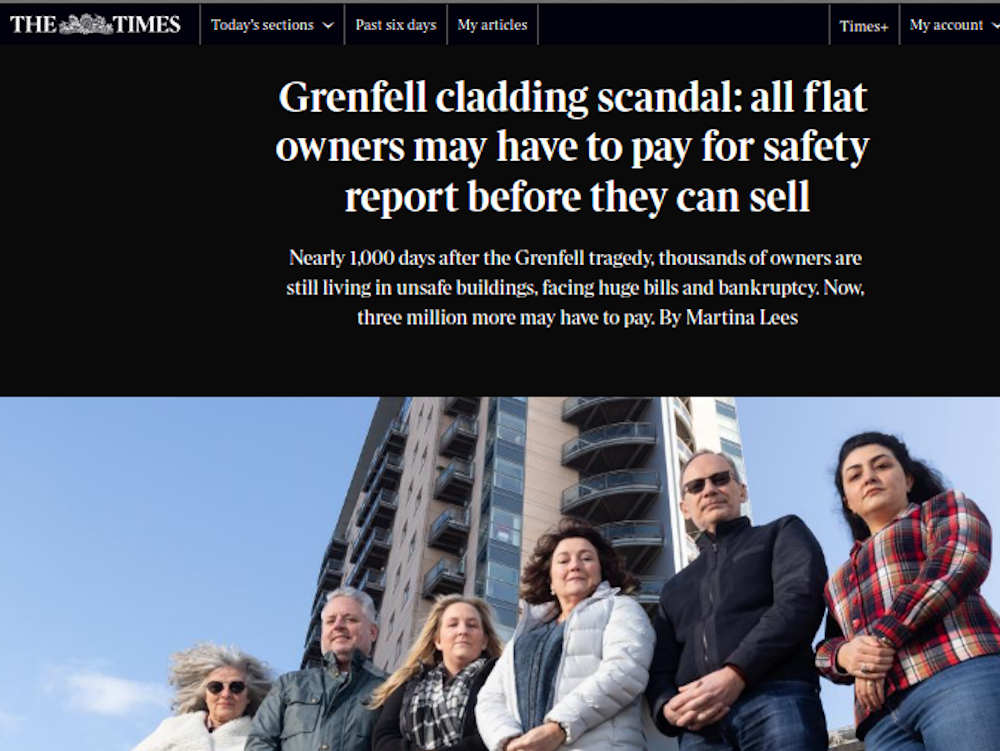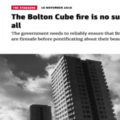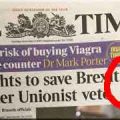
Cladding leaves owners stuck in flats they can’t sell
An estimated 200,000 homeowners are stuck in flats that they cannot sell because their buildings have been deemed unsafe by the government. Billions of pounds of value has been wiped from the properties amid a growing row over who is responsible for removing combustible cladding from the developments.
By Andrew Ellson
Billions of pounds of value has been wiped from the properties amid a growing row over who is responsible for removing combustible cladding from the developments.
Campaigners say that thousands of leasehold owners are facing bankruptcy and will lose their homes as they are presented with bills of more than £50,000 per flat to make their developments safe.
…
Sebastian O’Kelly, from the Leasehold Knowledge Partnership, said the government was in “chaos” over cladding. “The simple truth is that thousands of blocks of flats have been built with fire safety defects. Thousands will lose their homes unless government money shores up their badly-built buildings. But this means non-homeowning taxpayers paying out for those finally able to take a step on the property ladder.”
Cladding makes leaseholders ‘prisoners in their homes’
Michael Webber, 68, lives in Riverside Quarter, a development in southwest London by Frasers Property, which is also the freeholder and owner of the management company that oversees the block. When the development is finished this year it will include more than 650 flats, mostly privately owned.
Michael Webber, 68, lives in Riverside Quarter, a development in southwest London by Frasers Property, which is also the freeholder and owner of the management company that oversees the block.
…
Mr Webber said: “As far as we know, when built 14-18 years ago, these buildings were signed off by qualified building and fire inspectors. However, now, until each of these four buildings are given fire safety certificates, these 204 flats are unsellable. Leaseholders are prisoners in their flats …”
Grenfell cladding scandal: all flat owners may have to pay for safety report before they can sell
The flat owners with the most expensive fire patrol in Britain have had a “clad-ucation”, as they call it with commendable black humour. It started with strangers in hi-vis vests loitering in the courtyard of their timber-clad block in Leeds. Then they spotted the marshals watching Netflix – and X-rated content – while on duty.
By Martina Lees
Almost 1,000 days after the Grenfell Tower fire killed 72 people, the fallout from 20 years of failed building regulations that allowed the disaster to happen is affecting every flat in the UK. It is hitting buildings of all heights, with any type of cladding, or none at all. Now, The Sunday Times estimates that three million private flats in England could be affected, thanks to the latest government safety advice that is leaving owners unable to sell or get a new mortgage — even if their block is low-rise and safe.
“It’s an absolute mess out there,” says Martin Boyd, chairman of the Leasehold Knowledge Partnership, which campaigns for leasehold homeowners. “Nobody has any idea how to resolve the cladding crisis.”
I no longer buy little things like contact lenses. That’s £25 a month — two days of waking-watch payments
Abigail Tubis, 29, Leeds
I’m not only facing losing my home. Solicitors cannot be bankrupt, that would also mean losing my career
Rebecca Fairclough, 37, Manchester
My partner has had to return to supply teaching, aged 67, to help cover the mortgage
Carolyn Lovatt, 64, London
Flat-owners face trouble if they want to sell up
Owners of flats in England may be unable to sell because of new building safety advice issued in response to the Grenfell Tower fire. Fire safety guidance on external walls used to apply only to blocks taller than 60ft – typically six storeys.
Chad Cribbins and his wife, Niyati, lost a buyer for their flat in Shoreditch, east London, last week. Two banks refused to lend on the two-bedroom flat because the building did not have a full fire-risk certificate.
“We’ve got two boys and a daughter crammed into one bedroom,” said Cribbins, 44, who runs a travel business …
Lenders have required fire-risk reports since the government told building owners a year ago to ensure the safety of blocks above 18 metres. But they are no longer allowed to rely on computer studies. A specialist engineer has to cut holes to check installation and test cladding. A report is valid for all flats in the building, usually for five years …
Fears cladding scandal could grow as mortgages refused on buildings under 18m
Inside Housing, news, analysis, and comment about the social housing sector in the UK.





 10 housing ministers in 10 years: All you need to know …
10 housing ministers in 10 years: All you need to know …





















